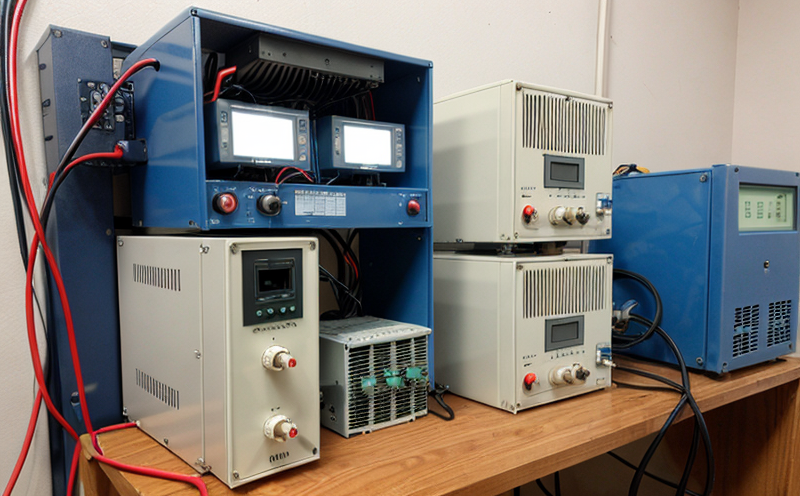UIC 550-2 Validation Testing of Traction Power Interfaces
The UIC 550-2 standard is a critical document used in the railway and transportation sector to ensure that traction power interfaces meet stringent safety, performance, and interoperability requirements. This service specializes in validating these interfaces through comprehensive testing according to the UIC 550-2 guidelines.
The primary focus of this validation testing is on the electrical and power supply systems within railway vehicles, ensuring seamless integration with the overhead power lines (OPL) or third rail. The test aims at assessing the following key parameters:
- Electrical contact performance
- Voltage stability during operation
- Current carrying capacity under specified conditions
- Thermal management of components during peak load
- Interference with other on-board electrical systems
- Compliance with international standards such as UIC 550-2, ISO and IEC specifications
The testing process involves rigorous preparation steps to ensure accurate results. Specimen preparation includes:
- Cleaning of the interface to remove any contaminants or residues.
- Application of appropriate lubricants if required by the test protocol.
- Ensuring that all components are in their specified operating condition before testing.
The actual testing process involves multiple stages, each designed to simulate real-world conditions and stress the interface. This includes:
- Simulated operation with variable voltage and current levels.
- Thermal cycling tests to evaluate long-term performance under temperature variations.
- Load shedding simulations to test resilience during power fluctuations.
- Interference testing to ensure minimal electromagnetic interference (EMI) impact on other systems.
The results are meticulously recorded and analyzed. Compliance with the UIC 550-2 standard is determined by comparing test data against acceptance criteria defined in the document. Non-compliance may indicate potential safety hazards or operational inefficiencies that need to be addressed before deployment.
This service ensures not only compliance but also enhances the reliability and safety of railway traction power interfaces, contributing significantly to passenger safety and reducing maintenance costs for railway operators.
Eurolab Advantages
Eurolab stands out in providing UIC 550-2 validation testing services due to several key advantages:
- Expertise and Experience: Our team consists of highly qualified engineers with extensive experience in railway traction systems.
- State-of-the-Art Facilities: We have cutting-edge test equipment capable of simulating a wide range of operational scenarios.
- Precision Instruments: Utilizing the latest precision instruments ensures accurate and reliable testing results.
- Comprehensive Testing Capabilities: Our laboratory can handle all aspects of UIC 550-2 validation, from initial setup to final analysis.
- Industry Knowledge: We stay updated with the latest industry standards and guidelines, ensuring that our tests are always relevant and effective.
These advantages allow us to deliver high-quality testing services that meet or exceed customer expectations. Our commitment to excellence ensures that we provide robust validation data for all traction power interfaces.
Customer Impact and Satisfaction
Our UIC 550-2 validation testing service has a significant impact on railway manufacturers, operators, and related entities in the transportation sector. By ensuring compliance with international standards, we contribute to higher safety levels, reduced maintenance costs, and improved reliability of railway systems.
Customer satisfaction is paramount for us. Our approach ensures that our clients receive accurate test results, detailed reports, and actionable insights into potential improvements for their products or services. This enhances the overall quality and performance of traction power interfaces, leading to enhanced customer confidence and trust in our services.
We also offer tailored solutions based on individual client needs, ensuring that we meet diverse requirements across various segments within the railway industry. Our commitment to excellence has earned us a reputation for providing reliable and efficient testing services, which is reflected in the consistent feedback from satisfied customers.
Competitive Advantage and Market Impact
The UIC 550-2 validation test of traction power interfaces provides several competitive advantages:
- Innovation Leadership: By adhering to the latest standards, we stay ahead in innovation and technology.
- Compliance Assurance: Ensuring compliance with international standards enhances market access and acceptance.
- Risk Mitigation: Early identification of potential issues through rigorous testing reduces risks and costs associated with product failures.
- Brand Reputation: Providing high-quality, reliable services builds a strong brand reputation within the sector.
In terms of market impact, this service supports sustainable growth by fostering trust among stakeholders. It also contributes to the overall safety and efficiency of railway operations, which is crucial for the industry's long-term development.





